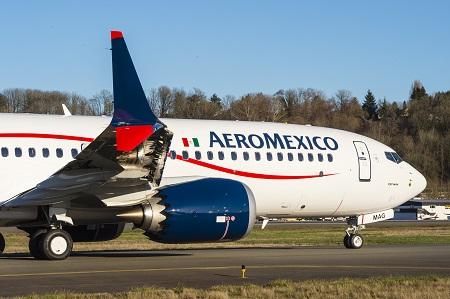It is in a way a "
divine surprise
" for the aircraft manufacturers.
Money remains abundant in the world to finance new planes ordered by airlines.
“
The aviation financing market is in very good health.
Companies have had no problem accessing abundant liquidity in 2020 and at low interest rates.
And 2021 is part of the same trend,
”underlines Tim Myers, president of Boeing Capital Corp, the subsidiary responsible for helping the companies that are clients of the American giant to find financing.
Read also: Aeronautics prepares the way out of the crisis
Admittedly, in 2020, this market suffered the blow of the health crisis with 59 billion dollars of financing mobilized in commercial aeronautics, according to the last annual study of Boeing on this market.
This is a decline of 40% compared to the 98 billion invested in 2019 (and 126 billion in 2018).
But this decline can be explained by the drop in shipments from manufacturers.
Boeing, deprived of the grounded 737 Max, delivered only 157 airliners last year, a drop of 59% compared to 2019. And Airbus handed 566 planes to companies, or 34% less than the previous year.
The two aircraft manufacturers suffered the repercussions of the Covid-19 crisis which led to order cancellations as well as postponements of deliveries.
Protect treasuries
But the delivered planes had no difficulty in obtaining financing.
“
Financiers and investors understand the resilience of the industry and the long-term fundamentals that make aircraft such a valuable asset class
,” says Tim Myers.
“
Despite the unprecedented impacts of Covid-19, there is generally still liquidity in the market for our customers, and we expect the situation to improve further as travel begins to rebound, thanks to the deployment of the vaccination and the lifting of restrictions,
”he continues.
In addition, explains the American giant, “the
development cycles of new aircraft are long and capital intensive.
These factors tend to give investors a long and protected time horizon to adjust, react and manage their assets in order to realize profits
.
Read also: Brussels aims for an agreement with Washington on Airbus-Boeing
For Boeing, "
100% of the planes were financed by external financial players
", specifies Tim Myers.
Manufacturers, forced to protect their own cash flow, have financed very little aircraft themselves.
On the other hand, they have sometimes agreed to keep planes built in their parking lot and deliver them only six months to a year from the expected delivery date.
This, without penalty, in order to help their customers.
The companies, for their part, have resorted to external financing in order also not to draw on their treasuries already undermined by the impact of the health crisis which brought air traffic to a halt in spring 2020.
This specialized market has many players such as aircraft lessors, export credit agencies, commercial banks, institutional investors such as insurers but also venture capital funds or even lease-back companies or even hedge funds, ready to take the risk of financing planes.
Key role of export credit agencies
The multiplicity of solutions offered on the market is suitable for airlines "
which tend to diversify their sources of financing
", notes the Boeing study.
Aircraft lessors have seen their market share increase to over 50% of the aircraft financed.
This, in particular with the increase in lease-backs.
The lessors bought planes held by airlines to rent them in stride.
Export credit agencies such as Exim in the United States, Coface in France, UKEF in Great Britain, Sace in Italy or even Euler-Hermes in Germany and EFA in Australia, “
have played a significant role in financing. planes since the outbreak of the health crisis
, ”notes a European expert.
Likewise, the capital market has responded.
“
Several lessors and airlines were able to raise 5 billion on the market, in ten days, to finance planes,
” notes a banker.
Another sign of the attractiveness of the aircraft, the arrival of new entrants on the aviation financing market who offer "
innovative solutions
", according to Boeing, which had 13 new operators and 18 financiers active in 21 countries in 2020. These new players "
will be even more active, looking for opportunities to increase their activity when the market rebounds,
" says Boeing.
This is for example the case of the Avenue Capital fund which has embarked on aircraft leasing, with a debt fund (Editor's note: debts) by creating a dedicated entity.
Financing of ultra-efficient aircraft
The long-term outlook for demand for new aircraft remains, according to Boeing, promising.
The manufacturer anticipates an increase of 4% per year in air traffic, in a full year of recovery from the crisis, over the next twenty years.
This will generate a demand for new aircraft bringing the global fleet to 48,400 aircraft by 2039, against 25,900 aircraft today.
This growth will also be driven by the withdrawal of fleets of aircraft over fifteen years old and their replacement by devices that consume less fuel, pollute less and have lower operating costs.
Despite “
plane-bashing
”, the plane therefore remains an attractive asset for investors.
"
We are not seeing any impact of these anti-aircraft campaigns on investor behavior, but it could come,
" said Boeing.
Under pressure from their shareholders in particular, the latter could however take a closer look at the type of aircraft they finance and explain that the most recent aircraft are much less polluting (-15% on average for each new generation) and that the next aircraft financed in the 2030s will be ultra-sober and then zero-emission planes, in particular based on green hydrogen.









